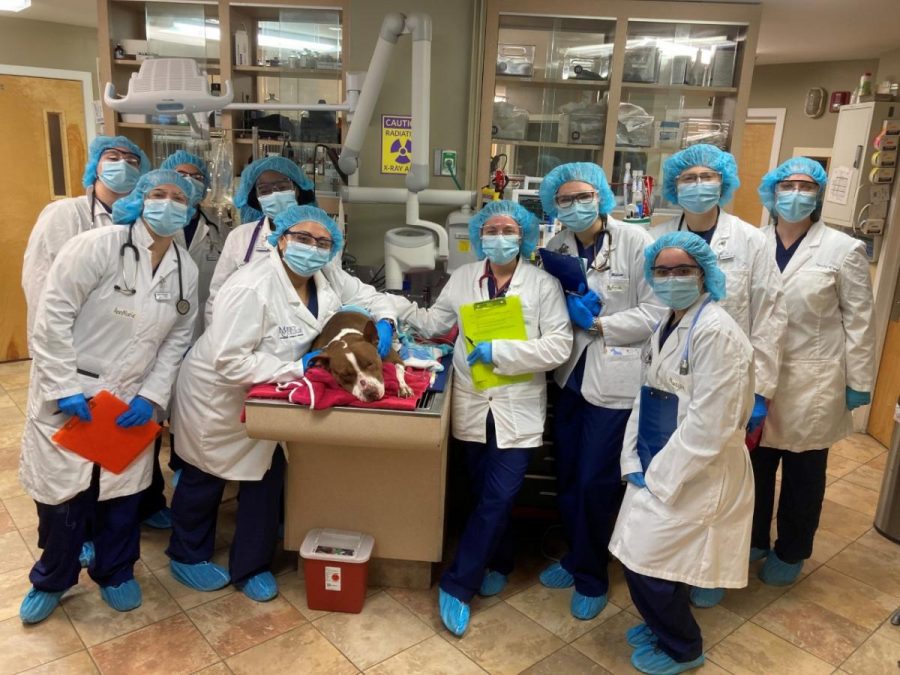Mercy Vet Techs Perform Dentistry at Local Shelter
Veterinary tech students from Mercy College’s Veterinary Technology Program provided free dental cleanings for local shelter animals over two days as part of their required pre-clinical training last month.
The students worked over three separate lab sessions at Animal Medical in New City in which they were able to apply the knowledge gained in the classroom to a real-world patient for the first time.
Prof. Sandra Bertholf, instructor for the clinical veterinary course and part-time worker at the animal hospital, helped set up the event and oversaw it both days.
“It’s a win-win situation where our students get to learn and these shelter animals are able to have free services provided to them,” Bertholf stated.
In the six years Mercy College has been helping out at local shelters as part of the pre-clinical training, it has provided very important services for the shelters. Many shelters operate on minimal funding so these opportunities allow it to provide expensive services at no cost to the shelters.
Bertholf noted that in order to deal with the ongoing COVID-19 pandemic students were reduced from groups of eight to ten down to groups of six to eight.
However, Bertholf said how the smaller groups were “better for the patients and the students.” This allowed for more hands-on time with the animals for each individual student.
The use of personal protective equipment that has become mandatory in most places since the start of the pandemic was not a major issue for the vet tech students. This is due to them being required anytime they would take care of the animals in order to protect the students during cleanings.
The pandemic has also forced the lecture portion of the program over to Zoom, which according to Bertholf, has made these “labs more important ever.”
She continued that these labs are a “huge part of learning. They need to be able to connect the information they get in the classroom to a real-life situation.”
These labs allow students, some for the first time, to work with a patient who is under anesthesia, take X-rays of the teeth, and then clean and polish them. This is all done under the watch of Bertholf and Program Director and Assistant Professor, Dr. Lisa Schenkel.
This creates a “safe environment where we have a little more control over what is happening.”
This is a crucial phase before students go on and start their clinical rotations in shelters next semester. Once in those roles, they will be expected to perform these tasks at a high level which is something the program constantly strives to reach.
Schenkel also stated how dental cleaning is only a single aspect of the learning experience which puts students into other scenarios they will face throughout their careers.
“We also have a surgical practicum for our students where we provide free spay/neuter services for shelter, rescue, and trap-neuter-return organizations. We also take a group of students abroad, usually during the winter intersession, in order to provide veterinary services in underserved areas as part of our Global Veterinary Experiences course.”
Bertholf also notes how the program is constantly looking for new places to send students not just to give them a learning experience but also to help out the shelters that are in need. They currently provided assistance for shelters and organizations throughout Westchester and Rockland County.
The program is always doing whatever it can to help wherever they can. They stress the friendly relationships between shelters, animal, and veterinary programs which allows for the best level of care for these animals. This is important in trying to find these animals a new permanent home.
This enables Mercy College’s Veterinary Technology Program to maintain a high level for its students and continue to set it apart from other programs. Bertholf who has been responsible for hiring new vet tech coming right out of college has seen a difference between Mercy graduates compared to others.
“In a two-year program, you just don’t have the same amount of time to be able to get into the in-depth level that we really focus on at Mercy. I definitely see the difference in graduates of other programs compared to Mercy graduates.”

James Tiedemann graduated from Mercy College in the May of 2022. He transferred there after graduating from SUNY Orange with his Associate's Degree in...








